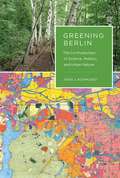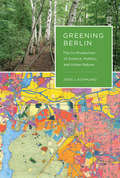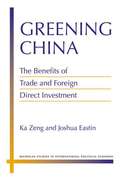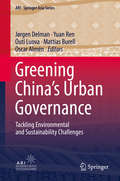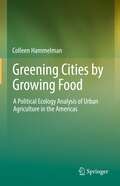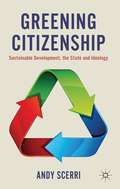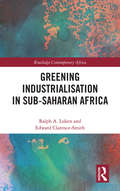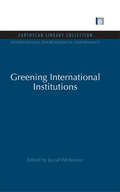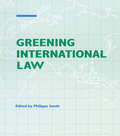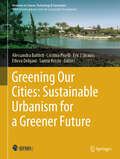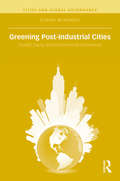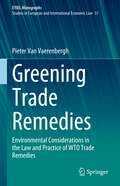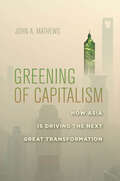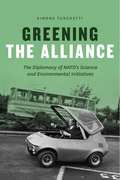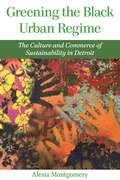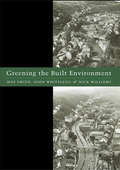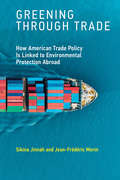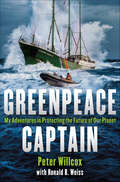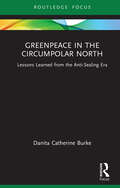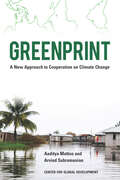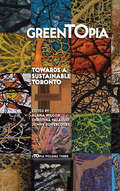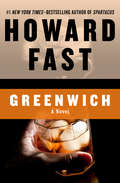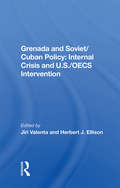- Table View
- List View
Greening Berlin
by Jens LachmundAlthough nature conservation has traditionally focused on the countryside, issues of biodiversity protection also appear on the political agendas of many cities. One of the emblematic examples of this now worldwide trend has been the German city of Berlin, where, since the 1970s, urban planning has been complemented by a systematic policy of "biotope protection" -- at first only in the walled city island of West Berlin, but subsequently across the whole of the reunified capital. In Greening Berlin, Jens Lachmund uses the example of Berlin to examine the scientific and political dynamics that produced this change. After describing a tradition of urban greening in Berlin that began in the late nineteenth century, Lachmund details the practices of urban ecology and nature preservation that emerged in West Berlin after World War II and have continued in post-unification Berlin. He tells how ecologists and naturalists created an ecological understanding of urban space on which later nature-conservation policy was based. Lachmund argues that scientific change in ecology and the new politics of nature mutually shaped or "co-produced" each other under locally specific conditions in Berlin. He shows how the practices of ecologists coalesced with administrative practices to form an institutionally embedded and politically consequential "nature regime." Lachmund's study sheds light not only on the changing place of nature in the modern city but also on the political use of science in environmental conflicts, showing the mutual formation of science, politics, and nature in an urban context.
Greening Berlin: The Co-Production of Science, Politics, and Urban Nature (Inside Technology)
by Jens LachmundHow plant and animal species conservation became part of urban planning in Berlin, and how the science of ecology contributed to this change.Although nature conservation has traditionally focused on the countryside, issues of biodiversity protection also appear on the political agendas of many cities. One of the emblematic examples of this now worldwide trend has been the German city of Berlin, where, since the 1970s, urban planning has been complemented by a systematic policy of “biotope protection”—at first only in the walled city island of West Berlin, but subsequently across the whole of the reunified capital. In Greening Berlin, Jens Lachmund uses the example of Berlin to examine the scientific and political dynamics that produced this change.After describing a tradition of urban greening in Berlin that began in the late nineteenth century, Lachmund details the practices of urban ecology and nature preservation that emerged in West Berlin after World War II and have continued in post-unification Berlin. He tells how ecologists and naturalists created an ecological understanding of urban space on which later nature-conservation policy was based. Lachmund argues that scientific change in ecology and the new politics of nature mutually shaped or “co-produced” each other under locally specific conditions in Berlin. He shows how the practices of ecologists coalesced with administrative practices to form an institutionally embedded and politically consequential “nature regime.”Lachmund's study sheds light not only on the changing place of nature in the modern city but also on the political use of science in environmental conflicts, showing the mutual formation of science, politics, and nature in an urban context.
Greening China: The Benefits of Trade and Foreign Direct Investment
by Ka Zeng Joshua Eastin"The authors make some very critical interventions in this debate and scholars engaged in the environmental 'pollution haven' and 'race to the bottom' debates will need to take the arguments made here seriously, re-evaluating their own preferred theories to respond to the insightful theorizing and empirically rigorous testing that Zeng and Eastin present in the book. " -Ronald Mitchell, University of Oregon China has earned a reputation for lax environmental standards that allegedly attract corporations more interested in profit than in moral responsibility and, consequently, further negate incentives to raise environmental standards. Surprisingly, Ka Zeng and Joshua Eastin find that international economic integration with nation-states that have stringent environmental regulations facilitates the diffusion of corporate environmental norms and standards to Chinese provinces. At the same time, concerns about "green" tariffs imposed by importing countries encourage Chinese export-oriented firms to ratchet up their own environmental standards. The authors present systematic quantitative and qualitative analyses and data that not only demonstrate the ways in which external market pressure influences domestic environmental policy but also lend credence to arguments for the ameliorative effect of trade and foreign direct investment on the global environment.
Greening China’s Urban Governance: Tackling Environmental and Sustainability Challenges (ARI - Springer Asia Series #7)
by Jørgen Delman Yuan Ren Outi Luova Mattias Burell Oscar AlménThis volume examines how urban stakeholders in China – particularly city governments and social actors – tackle China’s urban environmental crisis. The volume’s case studies speak to important interdisciplinary themes such as new tools and instruments of urban green governance, climate change and urban carbon consumption, green justice, digital governance, public participation, social media, social movements, and popular protest. It lays out a unique theoretical framework for examining and discussing urban green governance. The case studies are based on extensive fieldwork that examines governance failures, challenges, and innovations from across China, including the largest cities. They show that numerous policies, experiments, and reforms have been put in place in China – mostly on a pragmatic basis, but also as a result of both strategic policy design, civil participation, and protest. The book highlights how China’s urban governments bring together diverse programmatic building blocks and instruments, from China and elsewhere. Written by experts and researchers from different disciplines at leading universities in China and the Nordic countries in Europe, this volume will be of interest to researchers and students who are interested in Chinese politics, especially urban politics, governance issues, and social movements. Both students and teachers will find the theoretical perspectives and case studies useful in their coursework.The unique green governance perspective makes this a work that is empirically and theoretically interesting for those working with urban political and environmental studies and urbanization worldwide.
Greening Cities by Growing Food: A Political Ecology Analysis of Urban Agriculture in the Americas
by Colleen HammelmanThis book examines how urban agriculture (UA) is valued in the sustainable city. Through a comparative examination of UA projects in four cities across the Americas – Rosario, Argentina; Toronto, Canada; Medellín, Colombia; and Charlotte, USA – the book illustrates local manifestations of the socio-ecological dimensions of the global food system, and traces theoretical and empirical explanations for the impact of global political economic structures (sustainable neoliberalism) on local efforts to promote social and environmental goals through UA. The study contributes to literature on UA, sustainability, and urban geography through examining the ability of marginalized communities to compete for land on which to grow produce in contribution to their food security, livelihoods, communities, and environments, and will be of interest to UA practitioners, students, and scholars of geography, sociology, sustainability studies, environmental studies, and food studies.This project is distinctive for its global - local orientation that uses local cases to shed light on global phenomena relating to sustainability, neoliberalism, and policy mobilities. It is also important for its qualitative approach to understanding the perceived value of UA. Throughout the research, stakeholders emphasized the qualitative values of UA (such as social integration for new immigrants) that are not easily captured in statistical representations of the economic value of a given piece of urban land. As such, this book seeks to contribute to understanding about the contributions UA makes to a city beyond the food produced, and fill gaps in literature regarding the local manifestations of global policy in UA projects seeking to address both sustainability and social justice objectives.
Greening Citizenship
by Andy ScerriThe greening of citizenship, the state and ideology has created both opportunities and bottlenecks for progressive political movements. Scerri argues that these are pursuing justice by making holistic demands for: fair distribution and status recognition, adequate representation and effective participation.
Greening Industrialization in Sub-Saharan Africa (Routledge Contemporary Africa)
by Ralph Luken Edward Clarence-SmithThis book explores the concept of greening industrialization and issues and considerations surrounding it through the lens of Sub-Saharan Africa. The book critically examines the concept of greening industrialization and describes the progress and data challenges of monitoring the Sustainable Development Goals confronting African countries. The chapters summarize the policy and programme literature focused on eight policy regimes essential for greening industrialization and identify opportunities for greening industrial policies. The authors lay out a research agenda that would inform, enable and support greening industrialization in Sub-Saharan Africa and provide an overview of green industrial plans that include climate strategies, energy efficiency strategies and green industry assessments. This book will be of great interest to students, scholars, policy makers and planners in the fields of Sub-Saharan Africa development and African environmentalism.
Greening International Institutions (International Environmental Governance Set)
by Jacob WerksmanFirst Published in 2009. This title contains a diverse collection of pieces from which the reader can draw an understanding of the shape and function of the institutions discussed within, the scope of their activities, and the niche they occupy in the larger system. Werksman reveals a pattern that organizations grow and contract erratically and organically in response to competing demands, concerns and resources. This volume aims to raise questions as to whether the demands of sustainable development require a more fundamental push against the inertia of institutional culture.
Greening International Law
by Philippe SandsEnvironmental problems do not respect international boundaries; they affect the entire globe, and dealing with them is a matter for international political negotiation, law and institutions. Greening International Law assesses the extent to which the international community has so far adapted to address environmental problems, and examines the fundamental changes needed to the structure and organisation of the legal system and its institutions. The contributors to this volume have all played a central role in the development of international environmental law over the past decade, and their essays will be of interest to all those professionally, academically or individually concerned with the resolution of environmental problems.
Greening Our Cities: A Culmination of Selected Research Papers from the International Conferences on Green Urbanism (GU) – 6th edition and Urban Regeneration and Sustainability (URS) – 2022 (Advances in Science, Technology & Innovation)
by Alessandra Battisti Cristina Piselli Eric J Strauss Etleva Dobjani Saimir KristoThis thought-provoking book takes readers on a captivating journey through the realms of green urbanism, urban regeneration, and urban design, development, and preservation, providing an exploration of innovative approaches to creating sustainable and thriving cities of the future.Discussing the pressing challenges of urban environments, this book offers practical insights for architects, urban planners, researchers, and sustainability enthusiasts. It introduces cutting-edge strategies for sustainable urban mobility, energy-efficient designs, and nature-based solutions implementation while showcasing case studies and comprehensive analyses that shed light on the complexities of urban regeneration. Moreover, this volume uncovers the importance of preserving cultural heritage and its role in shaping vibrant communities. With its informative and engaging narrative, this book equips readers with valuable knowledge to make a positive impact on their urban surroundings. It deepens their understanding of urban challenges and illuminates ways they can contribute to transforming our cities toward a more sustainable and vibrant future.
Greening Post-Industrial Cities: Growth, Equity, and Environmental Governance (Cities and Global Governance)
by Corina McKendryCity greening has been heralded for contributing to environmental governance and critiqued for exacerbating displacement and inequality. Bringing these two disparate analyses into conversation, this book offers a comparative understanding of how tensions between growth, environmental protection, and social equity are playing out in practice. Examining Chicago, USA, Birmingham, UK, and Vancouver, Canada, McKendry argues that city greening efforts were closely connected to processes of post-industrial branding in the neoliberal economy. While this brought some benefits, concerns about the unequal distribution of these benefits and greening’s limited environmental impact challenged its legitimacy. In response, city leaders have moved toward initiatives that strive to better address environmental effectiveness and social equity while still spurring growth. Through an analysis that highlights how different varieties of liberal environmentalism are manifested in each case, this book illustrates that cities, though constrained by inconsistent political will and broader political and economic contexts, are making contributions to more effective, socially just environmental governance. Both critical and hopeful, McKendry’s work will interest scholars of city greening, environmental governance, and comparative urban politics.
Greening Trade Remedies: Environmental Considerations in the Law and Practice of WTO Trade Remedies (European Yearbook of International Economic Law #31)
by Pieter Van VaerenberghThis book explores the role of trade remedies in liberalising environmental trade and discouraging environmentally harmful trade. As trade remedies can pose a significant obstacle to environmental trade, this book outlines how trade negotiators can implement restrictions on the application of trade remedies on environmental goods. It also assesses whether and how investigating authorities can account for differences in environmental protection standards in trade remedy investigations and considers what a possible 'trade remedy' for environmental harm might look like. Although the book concludes that trade remedies will remain a trade instrument primarily driven by economic and competitiveness concerns, it demonstrates how environmental considerations can guide trade remedy policy, how investigating authorities can properly account for the environmental costs of production, and how the limited policy space available in the WTO Agreements on Trade Remedies can be used to pursue green policy goals.
Greening of Capitalism: How Asia Is Driving the Next Great Transformation
by John A. MathewsAs China, India, and other industrializing giants grow, they are confronted with an inconvenient truth: They cannot rely on the conventions of capitalism as we know them today. Western industrialism has achieved miracles, promoting unprecedented levels of prosperity and raising hundreds of millions out of poverty. Yet, if allowed to proceed unencumbered, this paradigm will do irreversible harm to the planet. By necessity, a new approach to environmentally conscious development is already emerging in the East, with China leading the way. Positioning its argument against zero-growth advocates and free-market environmentalists, Greening of Capitalism charts this transformation and sketches out a framework for more sustainable capitalism. State-mandated changes in energy use (as opposed to carbon taxes), a circular flow of resources (as opposed to emissions standards), and the introduction of new financial instruments that support green growth are cornerstones of China's framework. John A. Mathews argues that these tenets will be emulated around the world—first in India and Brazil. In light of this emerging shift, Mathews considers core debates over national security, international relations, and economic policy, ultimately addressing the question of whether these measures will be far-reaching or timely enough to prevent further damage.
Greening the Alliance: The Diplomacy of NATO's Science and Environmental Initiatives
by Simone TurchettiFollowing the launch of Sputnik, the North Atlantic Treaty Organization became a prominent sponsor of scientific research in its member countries, a role it retained until the end of the Cold War. As NATO marks sixty years since the establishment of its Science Committee, the main organizational force promoting its science programs, Greening the Alliance is the first book to chart NATO’s scientific patronage—and the motivations behind it—from the organization’s early days to the dawn of the twenty-first century. Drawing on previously unseen documents from NATO’s own archives, Simone Turchetti reveals how its investments were rooted in the alliance’s defense and surveillance needs, needs that led it to establish a program prioritizing environmental studies. A long-overlooked and effective diplomacy exercise, NATO’s “greening” at one point constituted the organization’s chief conduit for negotiating problematic relations between allies. But while Greening the Alliance explores this surprising coevolution of environmental monitoring and surveillance, tales of science advisers issuing instructions to bomb oil spills with napalm or Dr. Strangelove–like experts eager to divert the path of hurricanes with atomic weapons make it clear: the coexistence of these forces has not always been harmonious. Reflecting on this rich, complicated legacy in light of contemporary global challenges like climate change, Turchetti offers both an eye-opening history of international politics and environmental studies and a thoughtful assessment of NATO’s future.
Greening the Black Urban Regime: The Culture and Commerce of Sustainability in Detroit (Great Lakes Books Series)
by Alesia MontgomeryAlesia Montgomery’s Greening the Black Urban Regime: The Culture and Commerce of Sustainability in Detroit tells the story of the struggle to shape green redevelopment in Detroit. Cultural workers, envisioning a green city crafted by direct democracy, had begun to draw idealistic young newcomers to Detroit’s street art and gardens. Then a billionaire developer and private foundations hired international consultants to redesign downtown and to devise a city plan. Using the justice-speak of cultural workers, these consultants did innovative outreach, but they did not enable democratic deliberation. The Detroit Future City plan won awards, and the new green venues in the gentrified downtown have gotten good press. However, low-income black Detroiters have little ability to shape "greening" as uneven development unfolds and poverty persists. Based on years of fieldwork, Montgomery takes us into the city council chambers, nonprofit offices, gardens, churches, cafés, street parties, and public protests where the future of Detroit was imagined, debated, and dictated. She begins by using statistical data and oral histories to trace the impacts of capital flight, and then she draws on interviews and observations to show how these impacts influence city planning. Hostility between blacks and whites shape the main narrative, yet indigenous, Asian, Arab, and Latinx peoples in Detroit add to the conflict. Montgomery compares Detroit to other historical black urban regimes (HBURs)—U.S. cities that elected their first black mayors soon after the 1960s civil rights movement. Critiques of ecological urbanism in HBURs typically focus on gentrification. In contrast, Montgomery identifies the danger as minoritization: the imposition of "beneficent" governance across gentrified and non-gentrified neighborhoods that treats the black urban poor as children of nature who lack the (mental, material) capacities to decide their future. Scholars and students in the social sciences, as well as general readers with social and environmental justice concerns, will find great value in this research.
Greening the Built Environment
by John Whitelegg Maf Smith Nick J. WilliamsThis work aims to provide a possible specification of the problems involved in greening the built environment and an articulation of the solutions. It begins with a discussion of sustainability as a concept and its applicability to contemporary towns and cities. The following chapters take up particular aspects of the built environment and sustainability in greater depth and include the construction industry, transport, health, planning, community and equity issues, employment and the economy. The links between environmental damage, poverty and the economy are all themes in this book which also focuses on interconnections and on solutions to these three problems. The final chapter explains how the achievement of sustainable development is, in the authors' opinion, dependent on detailed solutions to everyday problems of modern society.
Greening the Globe
by Ann HironakaRecent decades have seen a rapid expansion of environmental activity in the world, including the signing of a growing number of environmental treaties and the formation of international organizations like the United Nations Environment Programme (UNEP). Greening the Globe employs world society theory (aka world polity theory or sociological institutionalism) to explore the origins and consequences of international efforts to address environmental problems. Existing scholarship seems paradoxical: case studies frequently criticize treaties and regulatory structures as weak and ineffective, yet statistical studies find improvements in environmental conditions. This book addresses this paradox by articulating a bee-swarm model of social change. International institutions rarely command the power or resources to directly impose social change. Nevertheless, they have recourse via indirect mechanisms: setting agendas, creating workspaces where problems can be addressed, empowering various pro-environmental agents, and propagating new cultural meanings and norms. As a result, world society generates social change even if formal institutional mechanisms and sanctions are weak.
Greening through Trade: How American Trade Policy Is Linked to Environmental Protection Abroad (The\mit Press Ser.)
by Sikina Jinnah Jean-Frederic MorinHow the environmental provisions in US preferential trade agreements affect both the environmental policies of trading partners and the effectiveness of multilateral environmental agreements.As trade negotiations within the World Trade Organization seem permanently stalled, countries turn increasingly to preferential trade agreements (PTAs) between smaller groups of nations. Many of these PTAs incorporate environmental provisions, some of which require trading partners to enact new domestic environmental laws, and use the enforcement mechanisms available within trade agreements as tools for environmental protection. In Greening through Trade, Sikina Jinnah and Jean-Frédéric Morin provide the first detailed examination of how the environmental provisions in US preferential trade agreements affect both the environmental policies of trading partners and the effectiveness of multilateral environmental agreements. They do so through a combination of in-depth qualitative case studies and quantitative analysis of an original dataset of 688 global PTAs. Jinnah and Morin explore the effects of linkages between PTAs and environmental treaties and the diffusion of environmental norms and policy through PTAs. Centrally, they argue that US trade agreements can serve as mechanisms both to export environmental policies to trading partner nations and third-party countries and to enhance the effectiveness of multilateral environmental agreements by strengthening their enforcement capacity. They caution that PTAs are not a panacea for environmental governance; deeper problems of unsustainable consumption and differential power dynamics between trading partners must be carefully navigated in deploying trade agreements for environmental protection.
Greenpeace Captain: My Adventures in Protecting the Future of Our Planet
by Peter Willcox Ronald B. WeissA Man. A Mission. GREENPEACE CAPTAIN PETER WILLCOX has been a Captain for Greenpeace for over 30 years. He would never call himself a hero, but he is recognized on every ocean and continent for devoting his entire life to saving the planet. He has led the most compelling and dangerous Greenpeace actions to bring international attention to the destruction of our environment. From the globally televised imprisonment of his crew, the "Arctic 30," by Russian Commandos to international conspiracies involving diamond smuggling, gun-trading and Al-Qaeda, Willcox has braved the unimaginable and triumphed. This is his story--which begins when he was a young man sailing with Pete Seeger and continues right up to his becoming the iconic environmentalist he is today. His daring adventures and courageous determination will inspire readers everywhere.
Greenpeace in the Circumpolar North: Lessons Learned from the Anti-Sealing Era (Routledge Explorations in Environmental Studies)
by Danita Catherine BurkeThis book explores Greenpeace’s efforts to expand its engagement in the Circumpolar North in the 21st century and how this work is affected and informed by the organization’s controversial legacy of anti-sealing campaigning in the 1970s and 1980s.Presenting the fallout for peoples and cultures targeted by Greenpeace’s anti-sealing campaigning as a pivotal dimension to the organization’s history, the book argues that this history must first be acknowledged in order to understand how Greenpeace has developed more positive working relationships in some instances with northern Indigenous peoples in recent years. The book looks to dispel the misconception that Greenpeace is universally rejected in the Circumpolar North, whilst also highlighting that its engagement and alliances are being built in the shadow of its yet-to-be fully tackled history as a leading part of the anti-sealing movement.Greenpeace in the Circumpolar North is ideal for courses and research with a focus on Arctic studies, environmental activism, and Indigenous studies, and for those interested in learning more about the complex legacy of Greenpeace.
Greenprint
by Aaditya Mattoo Arvind SubramanianBeleaguered by mutual recrimination between rich and poor countries, squeezed by the zero-sum arithmetic of a shrinking global carbon budget, and overtaken by shifts in economic and hence bargaining power between these countries, international cooperation on climate change has floundered. Given these three factors-which Arvind Subramanian and Aaditya Mattoo call the "narrative," "adding up," and "new world" problems-the wonder is not the current impasse; it is, rather, the belief that progress might be possible at all.In this book, the authors argue that any chance of progress must address each of these problems in a radically different way. First, the old narrative of recrimination must cede to a narrative based on recognition of common interests. Second, leaders must shift the focus away from emissions cuts to technology generation. Third, the old "cash-for-cuts" approach must be abandoned for one that requires contributions from all countries calibrated in magnitude and form to their current level of development and future prospects.
Greentopia: Towards a Sustainable Toronto (uTOpia)
by Jonny Dovercourt Alana WilcoxGardening the Gardiner. Hydrogen-fuelled cabs. Rooftop Power. Rainwater harvesting. A new model of taxation. The art of salvage. Drinking less coffee. Composters for dog poo in city parks. Ravine City.What would make Toronto a greener place?This third book in the uTOpia series asked imaginative Torontonians to think both big and small about how we might make our city more environmentally wise and responsible. They responded with immodest proposals and how-to tips, thoughtful considerations and flights of fancy that just might work. They wrote essays long and short, taking stock of how far weve come in the struggle to green ourselves and providing suggestions for simple actions with big effects. Their ideas sometimes playful, sometimes pie-in-the-sky offer brazen new perspectives on transportation, garbage, trees, energy, water, animals and green space and arrive at imaginative and ingenious solutions to the problems plaguing all modern cities.GreenTOpia features a resources section, including profiles of key eco-friendly groups in the GTA, a directory of green organizations, as well as a how-to guide and a fun-facts section.
Greenwich: A Novel
by Howard FastBestselling author Howard Fast&’s final novel—a page-turning tale of intrigue, power, and betrayal set in one of America&’s wealthiest suburbsGreenwich follows a diverse cast of characters in one of the country&’s most affluent towns: Greenwich, Connecticut. When evidence emerges that Richard Castle, a wealthy ex-government official, approved the 1980 killings of Jesuit priests and nuns in El Salvador, Castle must find a way to save himself from his ruthless former colleagues, who are bent on keeping the past buried any way they can. Told with Fast&’s typical brisk pacing, Greenwich explores the links between wealth and power, and the violence waged to maintain them. This ebook features an illustrated biography of Howard Fast including rare photos from the author&’s estate.
Grenada And Soviet/Cuban Policy: Internal Crisis And U.S./OECS Intervention
by Jiri ValentaThe turmoil in the Caribbean and Central America does not have a single cause; it results from both indigenous factors and outside intervention. Some liberals see revolution as the result of poverty and injustice and ignore the East-West security dimensions of the problem, the role of Leninist ideology, and the actions of the Soviet Union and its a
Grenada: Request for a Three-Year Arrangement Under the Poverty Reduction and Growth Facility--Staff Report; and Press Release on the Executive Board Discussion
by International Monetary FundA report from the International Monetary Fund.
